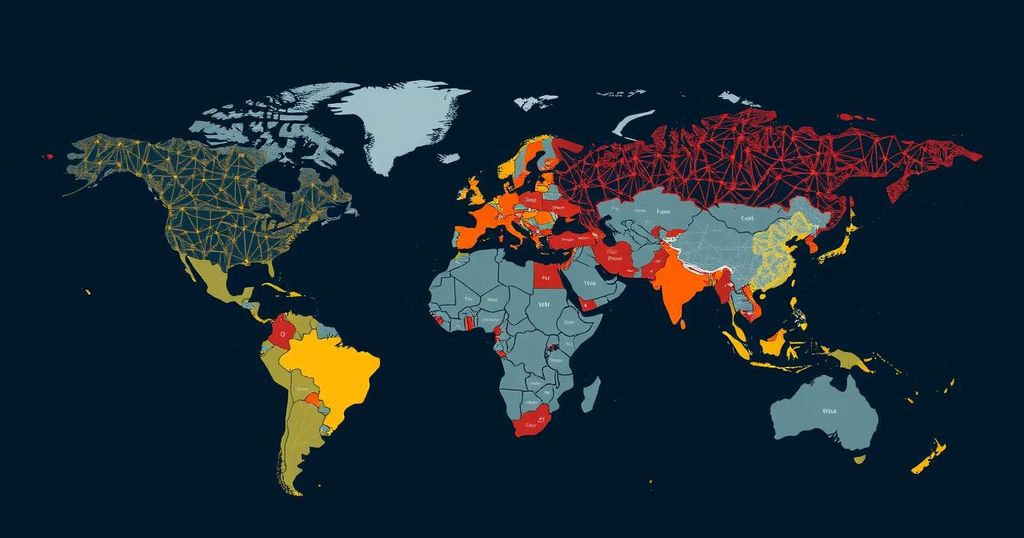Technology
APPLE, ASIA, ECONOMIC GROWTH, EUROPE, EXPORTS, FOREIGN INVESTMENT, GLOBAL FINANCE, GOOGLE, HARVARD, INNOVATION, INTERNATIONAL TRADE, INVESTMENTS, ISRAEL, KT CORPORATION, LG, MICROSOFT, MIT, NORTH AMERICA, NORWAY, SAMSUNG, SINGAPORE, SK TELECOM, STANFORD, UNITED KINGDOM, UNITED STATES
Fatima Khan
0 Comments
The 12 Most Advanced Countries in the World in 2024
In 2024, the most advanced countries globally are ranked based on technological progress, with South Korea leading, followed by the United States and Denmark. The analysis evaluates nations based on internet access, innovation capacity, and research investments, showcasing the collaborative spirit essential for advancing technology worldwide.
In 2024, the concept of advancement is increasingly defined by technological progress and innovation. This is reflected in the ranking of the twelve most advanced countries, with South Korea at the forefront, followed by the United States and Denmark. This assessment, published by Global Finance Magazine, evaluates nations based on internet and LTE user percentages, innovation capacity, research and development investments, and overall technological environment.
1. South Korea maintains its position as a global technology leader due to its high internet access, tech-savvy population, and substantial investment in research and development. Its illustrious companies like Samsung and LG embody the nation’s commitment to fostering innovation, particularly in artificial intelligence and robotics.
2. The United States boasts a legacy of technological breakthroughs, significantly investing 3.46% of its GDP in research and development. Renowned institutions cultivate experts that propel companies like Apple and Google, constantly pushing the frontiers of technology through notable achievements in various sectors including space exploration and renewable energy.
3. Denmark exemplifies a supportive environment for technological advancement, particularly in green energy and biotechnology sectors. Its collaborative culture, along with a robust welfare system, ensures high-quality education and significant government-funded digitalization initiatives.
4. Switzerland, recognized for its educational prowess in science and technology, is home to leading research institutions. The Swiss government incentivizes innovation, encouraging dynamic entrepreneurship, notably in pharmaceuticals and engineering.
5. Israel draws on its historical necessity for innovation, particularly in defense and agriculture. With strong governmental support for startups, a notable emphasis on cybersecurity, and advanced technologies like the Iron Dome, Israel remains a significant player in global tech innovation.
6. Finland shines in telecommunications and clean energy. Companies like Nokia and innovative strategies in education elevate Finland’s global ranking as a tech powerhouse, leveraging its unique challenges to fuel technological adoption.
7. The Netherlands, with a spirit of creativity and a rich trade history, is home to key players like ASML, a leader in semiconductor technologies. Its educational institutions cultivate a skilled workforce, promoting entrepreneurship and technological advancement.
8. Sweden benefits from a highly educated population and a digital infrastructure embracing sustainable technologies, exemplified by companies like Spotify. The cultural emphasis on collaboration fosters a robust environment for technological innovation.
9. Norway’s commitment to sustainability, including an impressive reliance on hydropower and electric vehicle adoption, positions it as a leader in green technology while promoting a highly skilled populace through education.
10. Singapore exhibits rapid technological growth driven by strategic government investments in research and development across various innovative sectors, emphasizing a systematic approach to cultivating talent and international collaboration.
11. The United Kingdom leverages companies at the forefront of biotech and AI, fostering advancements in sectors ranging from healthcare to aerospace while continuing to enhance its technological capabilities.
12. Belgium is investing in critical future sectors including cybersecurity and green energy initiatives, demonstrating a strong commitment to improving its technological outlook on the global stage.
The synergistic efforts of these nations illustrate that technological advancement is a collective endeavor, highlighting the importance of collaboration, resource investment, and continuous learning. The focus on innovation not only enhances their economic landscapes but also improves the quality of life for their citizens. The competitive spirit exhibited among these countries serves as a reminder that progress is achievable through shared dedication and effort across borders.
The evaluation of the world’s most advanced countries stems from the critical role technology plays in contemporary society. As nations face a multitude of challenges, their ability to adapt and innovate through technology becomes paramount for progress. The analysis provided by Global Finance Magazine sheds light on how countries utilize their unique resources and infrastructure to foster environments that support technological growth. Understanding the factors contributing to this advancement allows for a detailed exploration of how each country has achieved its respective standing in global rankings.
In summary, the twelve countries highlighted in the 2024 ranking exemplify the diverse approaches and strategies that drive technological advancement. From substantial investments in education to international collaboration and innovative research, each nation’s characteristics and commitments lay the groundwork for future success. The shared vision of these countries not only signifies national achievement but also underscores the global potential when nations work together towards innovation and sustainable development.
Original Source: www.worldatlas.com




Post Comment